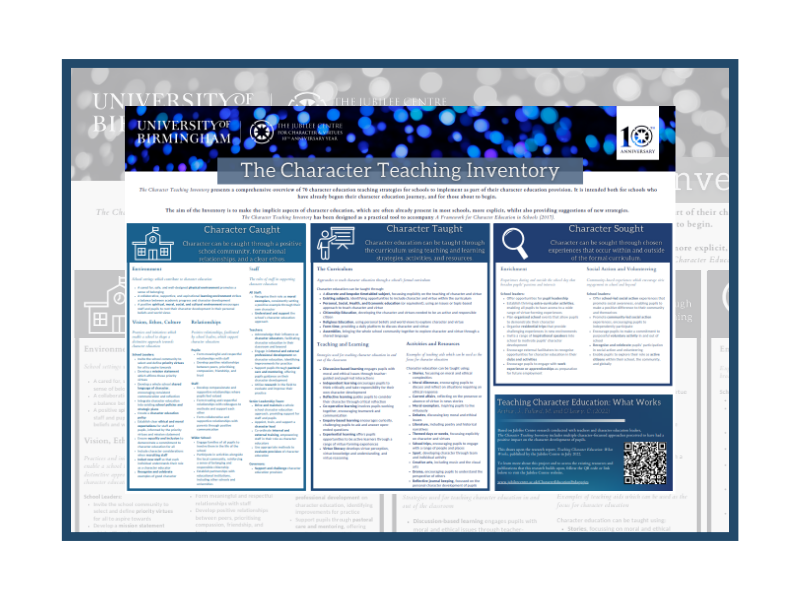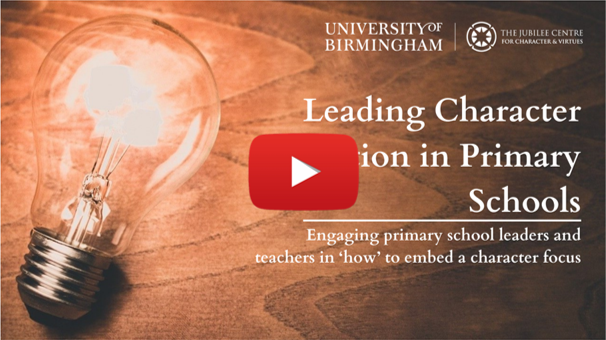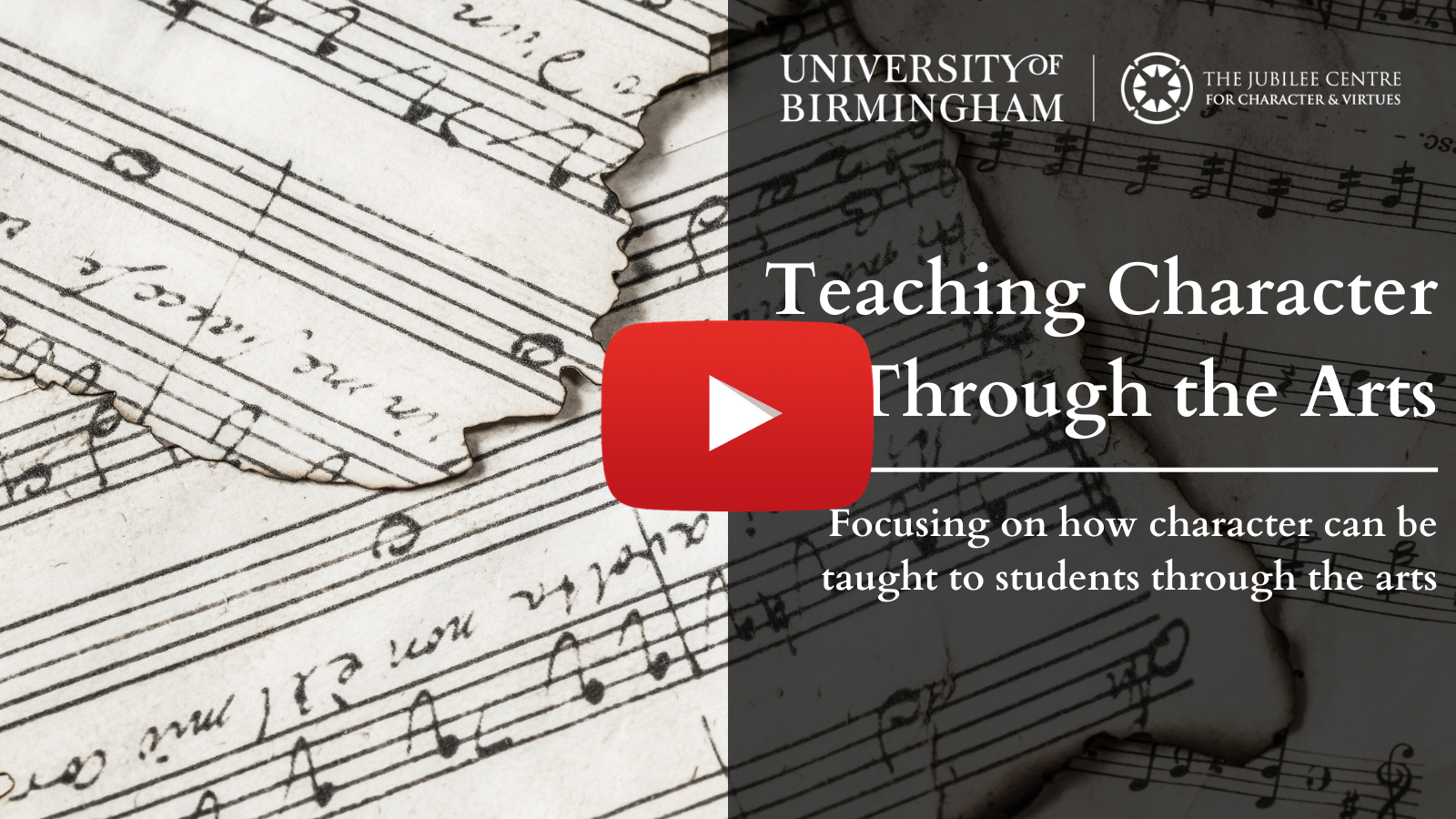Project Overview
The Character Education Pedagogies research project began in January 2021 and reviewed the Centre’s existing character education resources and research data with a particular focus on what pedagogical approaches were used. This analysis enabled the research team to produce a comprehensive database of pedagogical approaches for character education that included both caught, taught and sought strategies. The aim was to explore which character education teaching strategies are being used in schools and what impact these strategies are perceived to have on the character development of pupils.

Data gathered from the research has contributed to The Character Teaching Inventory. This Inventory presents a comprehensive overview of 70 character education teaching strategies for schools to implement as part of their character education provision. The Inventory aims to guide a leadership team and encourage the use of multiple caught, taught and sought teaching strategies across a school, making more explicit the implicit aspects of character education.
The Inventory has been designed as a practical tool to accompany The Jubilee Centre Framework for Character Education in Schools (2022) which has supported practitioners in more than 10,000 schools in developing a theoretical understanding whilst also providing a shared language of character.

Based on analysis of existing insights and Jubilee Centre research conducted with over 500 teachers and character education leaders from across the UK, The Character Teaching Inventory includes multiple character-focussed approaches perceived to have had a positive impact on the character development of pupils.
This draws upon the research report, Teaching Character Education: What Works, published by the Jubilee Centre for Character and Virtues in July 2022.
Summary of Key Findings
- Character education leaders and teachers reported using multiple teaching strategies across the categories of character caught, taught, and sought.
- In most cases, the character education teaching strategies reported as being used by schools spanned the categories of character caught, taught, and sought, highlighting how three categories should be viewed as interlinked and mutually supportive of each other.
- Character caught was deemed to be of particular importance in the early stages of the development of a whole school vision, ethos, and culture. Character education leaders highlighted the significance of three strategies as central to character caught – a set of priority virtues, a mission statement which explicitly references character, and a whole school shared language of character.
- Teachers considered school leaders to have had a positive impact upon their ability to deliver character education.
- Schools with an embedded and intentional character education provision appointed a leader of character education who was an existing member of the school’s leadership team.
- Primary schools reported using more character education teaching strategies than secondary schools.
Webinar Recordings
Building on the success of the ‘Leading Character Education in Schools’ CPD programme, this webinar aimed to engage primary school leaders and teachers in ‘how’ to embed a character focus in primary schools.
Utilising the primary teaching expertise that exists in the Jubilee Centre Research Team, the discussion provided insights for school leaders and primary teachers in ‘how’ a character approach can be adopted and how to embed both ‘taught’ and ‘caught’ approaches to character education.
This webinar focused on Jubilee Centre teaching resources that support the development of virtue literacy, that use role models as moral exemplars to learn from, that focus on existing issues in the curriculum, and that provide a character focus to teaching them in the classroom.
You can view the webinar below:

This webinar focused on how character can be taught to students through the arts, building on the success of practical teaching resources produced by the Jubilee Centre, such as Knightly Virtues, Virtue, Vice and Verse, and Read, Grow, Go.
This instructional webinar gave insights into how the resources were produced, the pedagogical approaches of teaching character through the arts, and provided examples of different artforms that can provide moral insights and engagement, such as literature, poetry and music lyrics.
You can view the webinar below:

Publications
Character Education in Schools
The Knightly Virtues programme was designed for 9 to 11 year olds and drew on selected classic stories to help teach moral character in schools.
The Character Education in UK Schools report was launched in 2015 and was one of the most extensive studies of character education ever undertaken, including over 10,000 students and 255 teachers in schools across the UK. The research explored the formation of character in students in 68 UK schools and investigated how teachers view their role in developing good character and virtue in students.
The Schools of Virtue project was launched in 2017 and focussed on three schools in Birmingham that place the development of their pupils’ character at the heart of their educational vision.
Windows Into Schools: Celebrating Character (2020) provides insights into the ways in which 8 case study schools provision for, embed and cultivate meaningful character education.
Character Education in the Professions
This research was designed to deepen understanding of the place of virtues in initial education, training and subsequent professional practice in key professions in the UK today. The Jubilee Centre has undertaken research in the profession of teaching, law, medicine, nursing, business and finance, and the British Army.
Statements
First published in 2013, with the latest iteration being published in 2022, the Jubilee Centre’s The Jubilee Centre Framework for Character Education in Schools sets out the Centre’s position on character education, what it is, and why it is important.
Published in 2015, Teacher Education and Character Education emphasises the importance of preparing teachers for the moral complexities of the profession and sets out key recommendations for teacher education.
Published in 2016, Character, Virtue and Practical Wisdom in the Professions aims to open up space for renewed debate, discussion and dialogue about the place of character, virtue and practical wisdom in professional practice.
